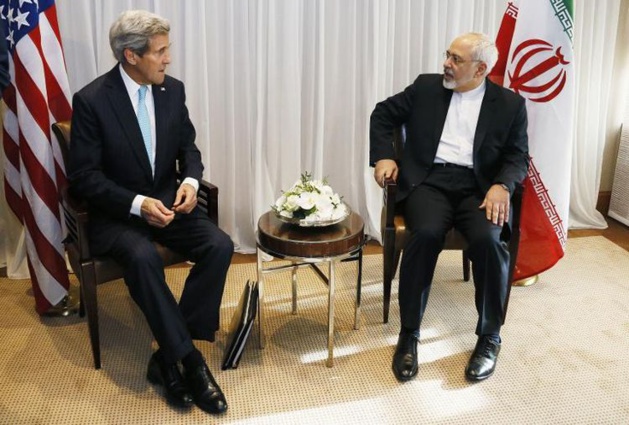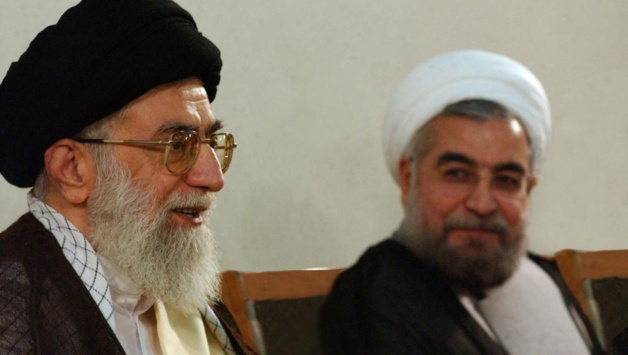As the Ambassador underlines it, the Iranian nuclear program started in the 1950’s and started to be questioned only in 2002, with the discovery of the nuclear sites Natanz and Arak, forcing United States to accuse Iran of constructing “weapons of mass destruction”. After that, the inspections of the IAEA (International Atomic Energy Agency) have permitted the discovery of enriched uranium traces, which was a violation of the nuclear non-proliferation Treaty that Iran signed. After the IAEA judged the Iranian cooperation “less than fulfilling”, Ahmadinejad got tough with the international community after he came to power in 2005 by starting again the activities of transforming uranium in Ispahan, and by multiplying the provocative announcements about the nature of the nuclear program. In 2006, the sanctions by the European Union and the United States are heavier, and the UNO imposes new ones. With Obama coming to power in 2009 and the election of the new Iranian president Rohani in 2013, the negotiations are becoming possible again, little by little.
The historical agreement of November 2013
The agreement of November 2013 that should have expired on the 24th of November, 2014, was extended for six more months, in order to get to a political agreement on the 31st of March, 2015, and to a global agreement before the 1st of July of the same year. It presents three major advantages. First of all, it ends the development of more sensitive elements of the Iranian nuclear program, in other words the end of the highly-enriched uranium production, the limitation of the production of new centrifuges (which allows the uranium enrichment), the blocking of construction of new installations and the stopping of the use of the nuclear reactor Arak. Then, the agreement allows a larger access to the Iranian nuclear facilities for the international community and the IAEA in order to verify if Iran respects its commitments. Eventually, this interim agreement is a real open door to negotiate a settlement for a long-range period. It is by the way approved by all the parties: Iran and the group 5+1 (China, Unites States, France, United Kingdom, Russia, Germany).
Indeed, the actual objective is to positively transform this agreement in the long run and to establish a solution that would allow Iran to have access to pacific nuclear energy. Sir Ali Ahani strongly insists on the need of a satisfying agreement for all the parties involved, and that could have no further interpretation possible. In this sense, he insists on the necessity to develop the civil program of the country, he recognizes the importance of giving solid guarantees to the group 5+1 about the nature only pacific of the program. According to him, Iran is united and determined about this will of reaching an agreement that respects the international community’s interests without questioning the main objectives of the country: “It is a responsible country, partisan of the logic, but its people will not let the negotiators give up on the national interests.”
Nevertheless, discrepancies seem to appear within the executive. Indeed, if Rohani declared that “our ideals go further than centrifuges” and proposed the settling of a referendum on a topic that “directly affects the population”, the Ayatollah Khamenei, Supreme chief of the country, expressed reservations on the negotiations underway on last February, considering that a bad agreement was not possible and that it was necessary to reconsider and adapt the calendar of the negotiations so it would allow the signature of a unique agreement with no intermediary step before the next 1st of July. In the other hand, the conservators denounced the direct negotiations between Iran and the United States, criticizing Mohammad Javad Zarif for walking next to J. Kerry. These evident differences of opinion could, however, have an important impact on the signature of an agreement, considering the supreme leader have the ability to set against it, even after a potential signature, and has by the way given the responsibility to M. Javad Zarif not to capitulate in front of excessive demands from the group 5+1.
Economic sanctions, the motor of negotiations
The economic sanctions have deeply weakened the country and its population. The Iranian GDP has fallen down by 25% during the last three years, the Rial, the Iranian money, has collapsed and the inflation has soared. As Mister Ambassador says it, the sanctions had no conclusive political results, but they have most of all affected the poorest and the middle class. Indeed, we could assist to the escape of many graduated people and to the reinforcement of radical speeches and anti-occident arguments. If the ancient Iranian president Ahmadinejad was a fervent defender of this anti-occidentalist movement, the new president Rohani underlines the fact that the Iranian people has elected him so things would change and insists on the necessity to reintegrate the country at the international scale, pointing out that “the country cannot wish a stable growth if it is isolated.” If the end of Iranian isolation appears as something capital for its population, Sir Ali Ahani still says the pride of the country has become self-sufficient in many sectors, insisting on the “scientific and medical improvements that put [Iran] at the front row in some fields today, which constitutes a national pride.”
After the agreement of November 2013, the commercial and financial sanctions that had been imposed since 2006 have progressively dropped, in exchange of guarantees on the limitation of uranium enrichment, showing the impossibility to transform the civil program into a nuclear program. Iran accepted this condition which, underlines Mister Ambassador, had a “global psychological impact.” But he still regrets the absence of “deep change” pointing out the timidity of European companies to establish in Iran or to start economical partnerships, when the American and Asian companies would already benefit from it.

However, two American Senators, Kirk and Menendez, have in the meantime introduced a bill of the Nuclear Weapon Free Iran Act of 2015 to the Senate on the last 27th of January, establishing additional sanctions in order to force Iran to negotiate in a more efficient way. The goal of this law is, according to its defenders, to stop Teheran from failing during the negotiations until June 30th, 2015. Obama suggested the adoption of such a law by the American Congress would be a direct risk to the smooth conduct of the negotiations, giving another argument to the radicals and those who have such discussions. On the other hand, the French, German and British Ministers of Foreign Affairs, along with the High Representative of the European Union, have insisted on the danger that such a law could fracture the international coalition, which would directly lead to a failure during the negotiations.
Prospect of an agreement: Iran, new key player?
The success of these negotiations is a priority for the American foreign policy, but also for many others of the international community. Nevertheless, the adoption of an exhaustive agreement is still very evasive, and many people question themselves if it is even possible. It remains very important to evaluate the possible impacts on the ending of these negotiations, as it could strongly impact the country, the region but also the foreign policy of many countries.
From a national point of view, the president Rohani has the improvement of the economic situation of the country and the development of international scientific, economic and diplomatic partnerships as main objectives. He has mentioned, as a consequence, his willing to collaborate with the United States in Iraq. However, if he is in charge of specific portfolios such as foreign policy, he still remains under the Supreme chief’s authority and the Revolutionary Guards’, which makes every reform more difficult to adopt and establish. For example, the Ayatollah Khamenei is firmly ideologically and religiously opposed to Israel, which makes him a criticized man regarding the foreign American policy in Middle East. As a consequence, if the conclusion of an agreement would positively influence the diplomatic relations between the United States and Iran, the link is still tenuous between the two countries.
Alongside, the success of the negotiations could lead the American administration to reconsider its policy in the Middle East and to think again about cooperating with Iran on some regional problems. By the way, Sir Ali Ahani insists on the place of the Iranian power in Middle East and on its stabilizing influence that could lead “the occidental countries [to ask for] its cooperation on different topics today.” He insists on Iran’s will to “promote peace” and to help collective operations. If he is conscious of the regional rivalries, he underlines “the Iranian position is against violence, terrorism and extremism.” To support this position, he mentions the Iranian collaboration with the international coalition against the Islamic state, criticizing some countries of this coalition to have directly participated to the development of the organization.
The neighboring countries are also directly concerned by the possibility of such an agreement. Israel is by the way totally opposed to any negotiation which, according to Prime Minister Netanyahou, is a major risk for the region and the whole world, because Iran would not respect the terms of the contract. Moreover, the balance of regional power would be modified with an increase of the tensions between Saudi Arabia and Iran, and Lebanon, Syria, Iraq and other countries of the Gulf. However, such an agreement could reduce the wish of Saudi Arabia to develop its own nuclear program.
If the negotiations continue and get complicated, the prospect of the signature of an agreement should still remain. Indeed, it would amplify the challenges of all the parties and would involve months, maybe years of surveillance from the IAEA. Historically, Iran did not always apply transparency on its activities. Moreover, every attempt to escape from its responsibility with an agreement could lead to serious reactions from Israel and the international community. At the present time, an agreement on the Iranian nuclear seems more reasonable than any other alternative. Indeed, the process would not have been that far if there really was no chance of any success.






























